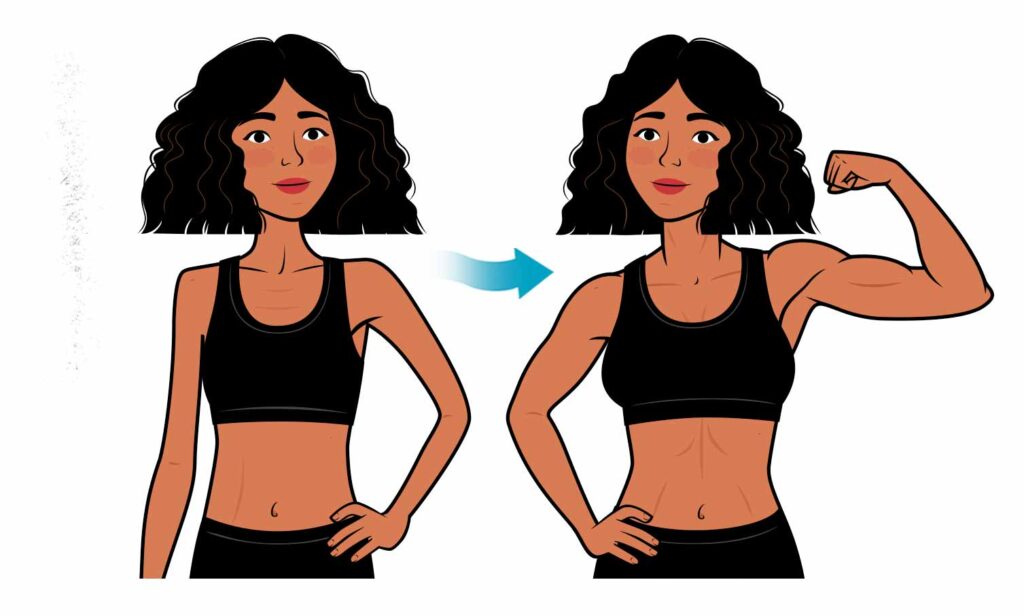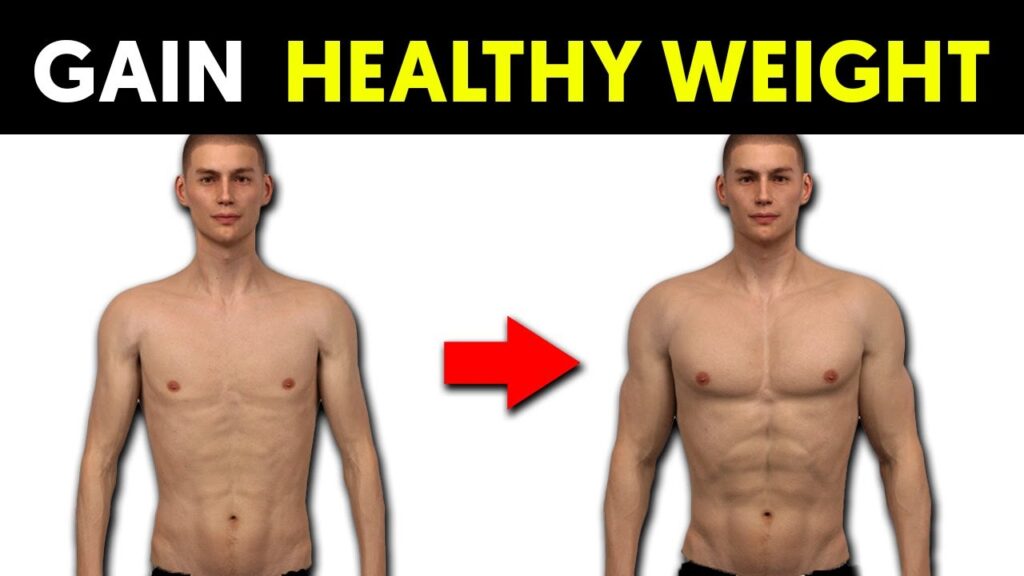How to Gain Weight with a Fast Metabolism

Introduction
For those with a fast metabolism, it can be quite the challenge when trying to put on weight. However, gaining weight can be as agonising a journey for some as losing it is to others. If you have a fast metabolism, your body is burning calories, and it can even easily put yourself in a more significant caloric deficit—oobviously not what we are aiming for to gain weight. By using a few key strategies, though, it is completely possible to still add weight and get muscularity if you have a quick metabolism.
In this article, we will go through the basics of weight gain (and why eating in a calorie surplus is so critical), how you should balance your macronutrients during it and finally some useful tips to make sure you reach those goals. This guide is going to help you if: you are a skinny guy with an ectomorph body and just can not gain weight (straightforward tips for you too).
Understanding Metabolism and Weight Gain
What is metabolism? Metabolism is the name of a whole range of processes by which your body converts food into energy. It is all of the chemical reactions responsible for maintaining life in a cell or organism. Your BMR (basal metabolic rate) is the amount of calories your body needs to perform just basic functions like breathing, circulation, and cell production. BMR is higher in fast metabolizers that burn more calories at rest than slower ones.
Weight gain happens when you consume more calories than your body burns, resulting in a caloric surplus. Because someone with a fast metabolism is burning so many calories even at rest, quite a large surplus must be present to not only counter this burn but also provide the additional energy needed for muscle growth and weight gain.
Why Gaining Weight is Important
Having an underweight BMI is a potential health risk for some, as it has been related to lower immune function, muscle loss, and possibly nutrient deficiencies. Too little weight will be able to limit performance, strength, and endurance—especially for athletes and fitness enthusiasts. As such, putting on weight in a healthy way is vital to everyone’s health and general performance while involved with physical activities or merely for vanity purposes.
The Caloric Surplus: Eating More Than You Burn
At the end of the day, weight gain simply requires you to eat more calories than your body needs. Easier said than done, especially with a fast metabolism and small appetite naturally. So here is how you can actually un-bitch your way into a surplus.
Calculate Your Caloric Needs:
First, we will calculate your Total Daily Energy Expenditure (TDEE) = BMR x physical activity level. So use an online calculator that considers your age, gender, weight and height, along with how active you are. When you have your TDEE, look to eat 300–500 calories above this a day and use it as the first step in gaining weight. Step 6: From this weight, if you do not see any result in next few weeks then add another surplus of up to a limit of around 500–700 calorie using the above guide.
Focus on Calorie-Dense Foods:
Calorie-dense foods are those that have more calories per serving, helping you consume additional calories without having to consume large amounts of food. Examples include:
- Nuts and Nut Butters: Almonds, Peanuts, Cashews, etc. — Rockstar source of healthy fats + proteins JERRY YANG
- Whole Grains: Oats, quinoa, brown rice and whole-grain breads are all rich in complex carbohydratesand fiber.
- Dairy: Full cream milk, cheese (especially cheddar), yoghurt and double cream all contain high levels of fat as well as some protein.
- Fats and Oils: Include olive oil, coconut oil, or avocado oil with your meals for some quick extra calories.
- Red Meat and Fatty Fish: Not only are these calorie dense foods, but they also provide important proteins and fats.
- Fruits and Nuts: Dried apricots, raisins or dates Fatty Eatsitsuits Lots of Calories
Eat Frequently:
Instead of taking meals three times a day, you can plan to take five or six light and small meals in your entire day. This way you will always be feeding your body and not overstuffing it at mealtimes.
Incorporate Snacks:
Whatever happens with regards to your weight, it will not be due simply because you snacked between meals on a handful of almonds for example. You can replace pastry with a protein bar, roasted nuts and seeds without oil or salt (if you mixed them in advance), or Greek yogurt-based mayonnaise that has the taste of honey. These are snacks that can be very easy to reach your goals of calories per day, but do not take too much space.
Drink Your Calories:
- Drinks are another easy way to do this, as they allow you to consume more calories that your stomach would otherwise handle ( 8, 9 ). Options include:
- Smoothies: Blend whole milk or yogurt with fruits to nut butter and protein powder, allowing for very caloric drinks
- Shakes —both homemade or commercially produced mass gainers can pack hundreds of calories in a single serving.
- Juices and Whole Milk: These have more calories than water, so these can be taken over the day.
The Role of Macronutrients in Weight Gain
It is not just the caloric density of the food but also what you eat. Proteins, fats and carbohydrates are three main groupings of macronutrients that cause weight gain or weight loss.
Protein form: increased muscle mass
You need protein to repair and grow muscles. When you want to put on some extra weight, especially in muscle mass form, it would mean that for each kilogram of your body the intake should be about 1.2– 2.7g of protein per kg of body mass. Lean meats, fish, eggs and dairy products as well legumes are high in protein; additionally, corsels contain whey or casein.’);
Carbs: Energy for your body.
Carbs Are Your Body’s Fuel This helps refuel the glycogen in your muscle, which is what fuels those heavy workouts that are necessary to break down and build up big muscles. Some good sources of complex carbs are sweet potatoes, oats, and brown rice, as they release energy slowly and contain more nutrients.
Fats: Concentrated Energy:
Fat contains 9 calories per gram; it is the most calorie-dense macronutrient. Incorporating healthy fats into your meals can dramatically increase the number of calories you consume without having to eat many voluminous foods. Emphasize monounsaturated fats found in avocados, nuts, seeds and olive oil, as well as omega-3 fatty acids from fattier fish.
Balancing Macronutrients:
For example, on a diet for weight gain, there should probably be 40–60% carbohydrates, but it can vary according to individual needs and objectives; the same goes for proteins (15–25%) and fats (25%–35%). In the end, you want to ensure that you are hitting your marks for each macronutrient so as not to deprive overall health and muscle growth.
Strength Training: Building Muscle to Gain Weight

A proper strength training program is going to moderate this in there viably, and also healthy weight gain simply via consuming more will not be the answer.
Why Strength Training Matters:
-
When you are strength training, muscle hypertrophy is stimulated, or the growth of your muscle cells. Weightlifting breaks down your muscle fibers—rripping them even further—and when the body repairs these tears by fusing fibres together (larger), they grow back bigger.
Compound Exercises:
-
Do compound exercises (squats, deadlifts, bench press, and rows). These are compound movements that work several muscle groups all at once, promoting larger muscle gain and, in turn, requiring more calories for recovery. You also produce more growth hormone with compound lifts than you would ever do in an isolation exercise.
Progressive Overload:
-
If you want to keep building muscle, the muscles need continued stimulus by increasing weight, number of sets, and/or intensity. This is the concept of progressive overload, which guarantees that your muscles are always changing and growing.
Rest and Recovery:
-
Remember, muscle does not grow in the gym, but it grows while you rest. Get enough rest (7-9 hours per day) and never push the same muscle twice without making sure it had 24 hours to recover. Also, recovery can be helped by including rest days as well as a light activity that could include stretching or walking.
Supplements: Enhancing Your Weight Gain Journey
A diet based on whole foods is ideal, but supplements play a key role when it comes to gaining weight with a fast metabolism.
Protein Supplements:
-
If you struggle to get enough protein from whole foods, there are some good options available for whey and casein or plant-based protein powders that can help you reach your goal. These supplements are convenient, easy to digest, and can be sprinkled over the top of smoothies, added to oatmeal, or baked goods.
Creatine:
-
Creatine is one of the most well-researched, inexpensive, and effective supplements you can take for gaining muscle mass. That works by raising your store of phosphocreatine in the muscles, which helps to make more energy (ATP) readily available for high-intensity training sessions. This means increased performance in the gym, and ultimately better muscle growth.
Mass Gainers:
-
A mass gainer is a supplement that appears as a high-calorie powder that includes protein, fat, and carbohydrates in bulk quantities. The most beneficial if you are someone who struggles to meet your calorie needs through food. Still, you need whole food, and the powders can just support isikkurate instead of substituting undesiccated foods.
Omega-3 Fatty Acids:
-
Fish oil and omega-3 supplements help decrease inflammation in the body and promote good heart health. Second, they can assist you in balancing the omega 3 and also omega-6 fatty acids, which are high in several of these calorie dense foods.
Multivitamins:
-
Supplement with a multivitamin: This can be helpful to ensure you achieve your micronutrient requirements, especially if fruits and veggies are lacking in the diet due to consumption of high-calorie foods. These substances are necessary for different things in our body like repairing muscles, producing energy, etc., and we call them micronutrients (micro—ssmall nutrient—also a scientific term).
Also read: The Role of Exercise in Fitness and Weight Loss
Conclusion: How to Gain Weight with a Fast Metabolism
If you have a fast metabolism, the solution to gaining weight is quite simple: all it takes is eating foods rich in calories that come with added proteins and containing some strength training exercises. Understand the importance of eating often nutrient-rich foods and consider a weight gainer if necessary. You have to be patient, and you should not rush it since gaining weight takes a great deal of time, in particular when your metabolism is really fast. Keep an eye on your progress and fine-tune eating habits and workouts as necessary in order to reach those weight gain goals.